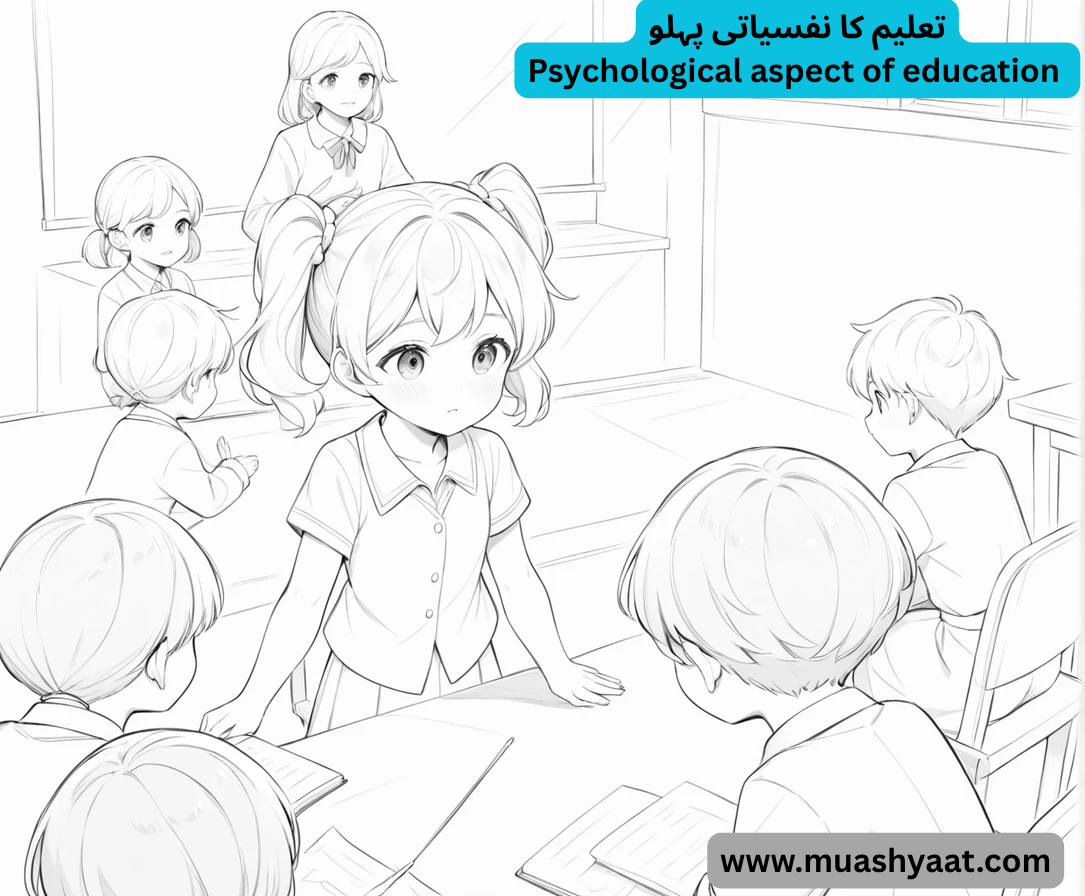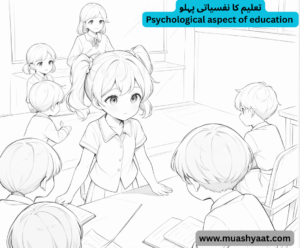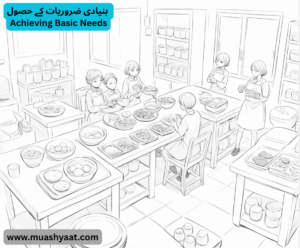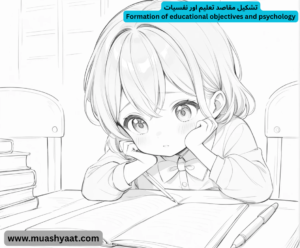تعلیم کا نفسیاتی پہلو ⇐ تعلیم اور تربیت کے پورے عمل میں بنیادی حیثیت ان بچوں کی ہے جن کے کردار کی تعمیر کر کے معاشرے کی ترقی ممکن ہوتی ہے۔ تربیت کے عمل میں بچوں میں موزوں رویے پیدا کرتے ہوئے ان کی ضروریات کو نظر انداز نہیں کیا جا سکتا۔ ہیں وہ مرحلہ ہے جہاں ہمیں علم نفسیات سے مددملتی ہے۔
Psychological aspect of education In the entire process of education and training, the fundamental position is that of children, whose character building makes the development of society possible. In the process of training, while instilling appropriate behavior in children, their needs cannot be ignored. This is the stage where we get help from psychology.
بنیادی اور ثانوی ضروریات
بچوں کی ضروریات دوقسم کی ہیں یعنی بنیادی ضروریات اور ثانوی ضروریات۔ بنیادی ضروریات یہ ہیں ۔ خوراک لباس تحفظ نشوونما صحت وصفائی آزادی اور معاشرے میں باعزت مقام کا حصول ۔ ہر فردان ضرورتوں کی تکمیل چاہتا ہے اور ان کا حصول اسے اطمینان بنتا ہے۔
Basic and Secondary Needs
Children’s needs are of two types, namely basic needs and secondary needs. The basic needs are: food, clothing, protection, growth, health, hygiene, freedom and achieving a respectable position in society. Every individual wants to fulfill these needs and achieving them gives him satisfaction.
عدم تکمیل
ان میں سے کسی ضرورت کی عدم تکمیل اسے پریشان کر دیتی ہے۔ مثلا خوراک میسرنہ آئے تو بھوک کی کیفیت پیدا ہوتی ہے اور وہ خوراک کے حصول کیلئے کوشاں رہتا ہے۔ معاشرے میں اسے عزت کا مقام نہ ملے تو دو بے چینی محسوس کرتا ہے اور عزت کے حصول کیلئے جد و جہد کرتا ہے۔ اس لیے ان تقاضوں کو بنیادی ضروریات کا درجہ حاصل ہے۔
Unfulfillment
The unfulfillment of any of these needs makes him anxious. For example, if food is not available, a state of hunger arises and he strives to obtain food. If he is not given a place of respect in society, he feels restless and struggles to achieve respect. Therefore, these requirements have the status of basic needs.
بنیادی ضروریات کے حصول
معاشرے میں افراد کو اپنی بنیادی ضروریات کے حصول کیلئے مختلف قسم کی اشیاء طریقہ ہائے کار رویوں اور معاشرتی اداروں کی ضرورت پیش آتی ہے۔ وہ چیز یں یا سرگرمیاں جو بنیادی ضروریات کی تکمیل میں معاون ہوتی ہیں۔ ثانوی ضروریات کہلاتی ہیں۔ مثلا خوراک ایک شخص کی بنیادی ضرورت ہے۔
Achieving Basic Needs
In society, individuals need various types of objects, procedures, behaviors, and social institutions to achieve their basic needs. Those objects or activities that help in fulfilling basic needs are called secondary needs. For example, food is a basic need of a person.
زمین کاشت کرنا
خوراک کے حصول کیلئے زمین کاشت کرنا پڑتی ہے۔ اس سلسلے میں کا شتکاری کے اوز ار ان کا استعمال آبپاشی اور اس کے طریقے اچھے بیجوں کا انتخاب فصل بونا اسے کاٹنا اسے محفوظ کرنا اسے نزدیکی منڈیوں تک لے جانا اس کی خرید و فروخت اور تقسیم عملہ کا سلسلہ وغیرہ وہ کڑیاں ہیں جو خوراک کے حصول کیلئے ثانوی ضروریات کا درجہ رکھتی ہیں۔
Cultivating the land
To obtain food, one has to cultivate the land. In this regard, the use of agricultural tools, irrigation and its methods, selection of good seeds, sowing the crop, harvesting it, preserving it, transporting it to the nearest markets, its purchase, sale and distribution, the chain of personnel, etc. are the links that are secondary necessities for obtaining food.
بنیادی اور ثانوی ضروریات کے تعین میں نفسیات کا کردار
علم نفسیات ان بنیادی ضروریات کے تعین میں اور متعلقہ ثانوی ضروریات کو معلوم کرنے میں مدد کرتا ہے۔
مقاصد تعلیم اور مقاصد مضامین کے تعین میں فرد کی ضروریات کا خیال رکھا جاتا ہے۔
The role of psychology in determining basic and secondary needs
- Psychology helps in determining these basic needs and in identifying the related secondary needs.
- The needs of the individual are taken into account in determining the objectives of education and the objectives of subjects.
تدریس کے استعمال
ترتیب مواد میں، تعلیمی جائزہ کے عمل میں طریقہ ہائے تدریس کے استعمال میں تدریس کے عمل کو زیادہ مؤثر بنانے میں بچوں کو سمجھنے میں ان کی دلچسپیوں کے مطابق ہیں تعلیم دین میں غرضیکہ ہر تعلیمی مرحلے میں تعلیمی نفسیات کے اصول ہماری رہنمائی کرتے ہیں۔
Teaching Uses
In the arrangement of materials, in the process of educational assessment, in the use of teaching methods, in making the teaching process more effective, in accordance with the interests of children in understanding their purpose in religious education, the principles of educational psychology guide us at every educational stage.
تشکیل مقاصد تعلیم اور نفسیات
تشکیل مقاصد تعلیم میں یہ امر پیش نظر رکھا جاتا ہے کہ یہ مقاصد تعلیم بچے کی کون کون سی ضروریات کو پورا کرتے ہیں۔ اگر مقصد تعلیم بچے کی تحریر کوبہتر بناتاہے تو بچے کو اس سے معاشرے میں اچھا مقام ملے گا۔ اگر مقصد تعلیم اس میں اچھی تقریر کی صلاحیت کو اجاگر کرنا ہے تو وہ بات کرنے کا سلیقہ سیکھ لے گا اور معاشرے میں اچھا مقام حاصل کرلے گا۔ یہ اس کی بنیادی ضرورت ہے۔
Formation of educational objectives and psychology
In the formation of educational objectives, it is kept in mind that which needs of the child are fulfilled by these educational objectives. If the objective of education is to improve the child’s writing, then the child will get a good position in society. If the objective of education is to highlight the ability of good speech in him, then he will learn the etiquette of speaking and achieve a good position in society. Thirst is a basic need.
نصاب سازی کا عمل اور نفسیات
نصاب سازی کے عمل میں ہر مرحلے پر بچے کی ضروریات کو پیش نظر رکھا جاتا ہے۔
نفس مضمون کے انتخاب میں بچے کی بنیادی اور ثانوی ہر دو ضروریات کا خیال رکھا جاتا ہے کہ کیا اس مضمون کے پڑھنے سے بچے کی فوری ضروریات پوری ہوں گی یا مستقبل قریب کی یا مستقبل بعید کی۔
Curriculum Development Process and Psychology
- The needs of the child are kept in mind at every stage in the curriculum development process.
- In selecting the subject itself, both the primary and secondary needs of the child are taken into account, whether the study of this subject will fulfill the child’s immediate needs or those of the near or distant future.
تجربات کے مطابق ؟
یہ بھی خیال رکھا جاتا ہے کہ کیا یہ نفس مضمون بچے کی عمر اورتجربات کے مطابق ؟ مواد کی ترتیب میں آسان سے مشکل سادہ سے پیچیدہ مادی سے غیر مادی مرئی سے غیر مرئی اور معلوم سے غیر معلوم تک کے نفسیاتی اصولوں کو پیش نظر رکھا جائے گا۔
According to experiences?
It is also taken into account whether this subject is according to the child’s age and experiences? In the arrangement of the content, the psychological principles of easy to difficult, simple to complex, material to immaterial, visible to invisible, and known to unknown will be kept in mind.
ہم أمید کرتے ہیں آپ کو “تعلیم کا نفسیاتی پہلو” کے بارے میں مکمل آگاہی مل گئی ہوگی۔۔۔
MUASHYAAAT.COM 👈🏻 مزید معلومات کیلئے ہمارے اس لنک پر کلک کریں
ہماری ویب سائٹ پر آنے کیلئےشکریہ




